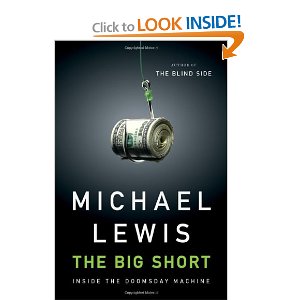NNT wasn’t the only one who saw it coming. In ‘The Big Short’ Michael Lewis documents a few others who did see it coming and who turned that into a successful investment strategy. I haven’t read it yet but in this NPR interview with Terry Gross (NPR link), Michael gives us the synopsis and it sounds to me like a great read.

On reform. Excerpt from March 16, 2010 interview with NPR’s Terry Gross.
TG:So when you look at the reforms of the financial system that are being proposed now, what do you see?
ML:Well, for the last eighteen months, we have been dealing with symptoms of the the crisis rather than the cause, there has been no reform. It’s been delayed, and that’s not surprising. I mean, financial markets move quickly and democracy moves slowly. The crash of 1929 happens in 1929 and Glass Steagall, which reforms Wall St. in a radical way doesn’t happen until 1933. There aren’t even proper hearings on Capital Hill about the crisis of ’29 until, I think, late ’32. And so it’s not that surprising it’s taken a while. But the ideas that are now being batted around, and, it does look like financial reform is about to get moved to the front burner. ah… there’s some really good ones. It’s just a question of whether they can be pushed through over the objections of Wall St. ’cause they’re all antithetical to the interests of Wall St.
The first is… It’s crazy- a Wall St. firm can advise customers to buy and sell stocks and bonds and at the same time be making bets with its own money, on those stocks and bonds.
TG: Betting against them.
ML: Yeah!
TG: You’re the broker, you tell me to buy the bonds, and then you bet against those bonds.
ML: Yeah!
TG: That they’re going to fail.
ML: It creates a natural, horrible, poisonous relationship between Wall St. and the people it advises. If the Wall St. firm is making it’s own side bets at the same time it’s advising the customers what to do.
TG: It’s such a conflict of interest!…
ML. Especially since the Wall St. firms make their money with their own side bets. So inevitably what happens is, the customers get used, as a tool for their own portfolio- to get out of things they don’t want to own, and so on and so forth. The so called Volcker rule named for Paul Volcker because he’s advocating it, makes total sense. It’s to say to these firms. “You can’t trade for your own accounts in things where you’re advising customers”. So that’s a really simple reform. But it’s going to be devastating to Wall St.
Another simple reform, I mean, it’s so obvious, that, you can’t believe it hasn’t happened yet. Just eliminate these bilateral private transactions that go on between these firms that leave them exposed to each other. Like credit default swaps. Why should Deutsche Bank be able to call up Morgan Stanley and make an 8 billion dollar bet that neither one of them actually records on their balance sheets? It creates horrible uncertainty and instability to have this kind of murky world of side bets going on. And nobody knows who’s got them. So you never know how healthy these institutions are. So, all things that are traded, credit default swaps for example, should be traded through exchanges, and on screens so everybody can see them. Now that kind of transparency, again, is anathema to Wall St. cause they make a lot of money, off the opacity. They make a lot of money out of people not seeing what the right price of things should be. But they’re fighting that tooth and nail.
And a third thing- it’s very obvious, so obvious you can’t believe it hasn’t happened is- Why on earth are the ratings agencies- Moody’s and Standard and Poor- paid by the people whose bonds they are rating? It’s inevitably going to lead to problems because they’re incentivized to please the people that pay them.

